Plot summary
A Chicago newspaper man, Larry Doyle, finds himself in St. Louis after a night of drunken revelry. Low on money, he sees a young woman, Anne Olgivie, at a coffee counter. She hasn't got enough money to cover her bill, so he surreptitiously pays for her. Later, after sending a telegram to his boss asking for funds, Larry sees Anne again, trying to send a wire to her mother for money to come home. Unable to pay for the message, she leaves, and Larry recovers her note. Exiting to the street, he thinks he sees Anne throw herself in front of a car, so he grabs her, making it look as if she embraces him wildly. He admits to her that he is broke and that he knows she is, as well. They take a suite in a Hotel, pretending to be on their honeymoon and try to raise some money. After being revealed to the hotel manager, Larry receives fifty dollars from his coworkers, which gives them some time. Larry attempts to get a job with a local paper because he has a line on the Eel, a local gangster. But his boss in Chicago denies his identity. Again out of money, Larry pawns a police revolver he was given as an award for solving a case in Chicago. Shortly thereafter, Larry and Anne witness a robbery by the Eel, where a police officer is killed. Larry takes the place of the getaway driver and gets the loot before driving off. The next day, Larry describes the robbery to the police, while hiding his involvement. But when the gun used is found, it turns out to be Larry's. Once the police figure out Larry's part in the robbery, he is suspected of murder. When his boss in Chicago finally admits who he is to the police, he is given twenty-four hours to find the Eel. Returning with Anne to the pawn shop, which they have worked out is the meeting place, Larry confronts the pawn broker, reveals he knows of the broker's complicity and they fight. Having knocked out the broker, Larry pretends to be him when the Eel arrives. But the Eel isn't fooled and attempts to shoot him, but is shot by Anne, instead. When the story hits the papers, Larry is worried because they all refer to Anne as "Mrs. Doyle", meaning they'll have to get married, which is fine with them both.

Anthony John Spilotro, nicknamed "Tony the Ant", was an American mobster and high-ranking member of the Chicago Outfit who operated in Las Vegas during the 1970s and '80s. Spilotro managed the Outfit's illegal casino profits when four of the casinos, the Stardust, the Fremont, the Hacienda and the Marina, were managed by Frank "Lefty" Rosenthal, replacing Outfit member John Roselli. He was also the leader of the "Hole in the Wall Gang", a burglary crew he formed when he moved to Las Vegas in 1971.

Layer Cake is a 2004 British crime drama thriller film directed by Matthew Vaughn, in his directorial debut. The screenplay was adapted by J. J. Connolly from his 2000 novel of the same name. The film was produced by Adam Bohling, David Reid and Vaughn, with Stephen Marks as executive producer. The title refers to the social strata, especially in the British criminal underworld. The film's plot revolves around a London-based criminal, played by Daniel Craig, who works in the cocaine trade and wishes to leave the drug business. The film also features Tom Hardy, Michael Gambon, Colm Meaney, and Sienna Miller. Craig's character is unnamed in the film and is listed in the credits as "XXXX".
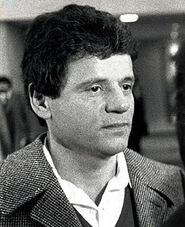
Michael Peter "Micky" Spilotro was the younger brother of Anthony "Tony the Ant" Spilotro and was an associate of the Chicago organized crime organization referred to as "The Outfit".

The Coming of the Quantum Cats is a 1986 science fiction novel by American writer Frederik Pohl. It was originally serialized in Analog science-fiction magazine, January–April 1986.

Last Man Standing is a 1996 American Neo-Western action film written and directed by Walter Hill, and starring Bruce Willis, Christopher Walken and Bruce Dern. It is a credited remake of Akira Kurosawa's Yojimbo.
The Irish Mob is a usually crime family–based ethnic collective of organized crime syndicates composed of primarily ethnic Irish members which operate primarily in Ireland, the United States, the United Kingdom, Canada and Australia, and have been in existence since the early 19th century. Originating in Irish-American street gangs – famously first depicted in Herbert Asbury's 1927 book, The Gangs of New York – the Irish Mob has appeared in most major U.S. and Canadian cities, especially in the Northeast and the urban industrial Midwest, including Boston, New York City, Philadelphia, Pittsburgh, Baltimore, Cleveland, and Chicago.
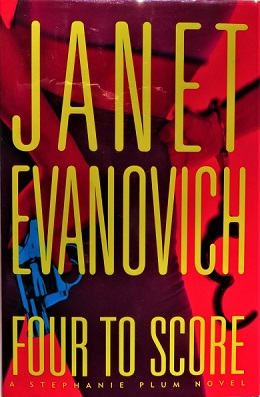
Four to Score is the fourth novel by Janet Evanovich featuring the bounty hunter Stephanie Plum and her friends and family in New Jersey. Written in 1998, it is set mainly in Trenton, but also includes Point Pleasant and Atlantic City.
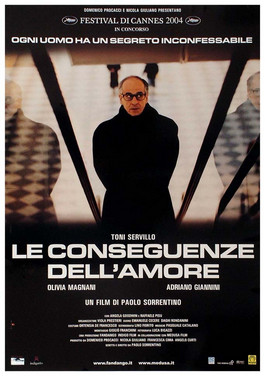
The Consequences of Love is a 2004 Italian psychological thriller film written and directed by Paolo Sorrentino. It stars Toni Servillo, Olivia Magnani, Adriano Giannini, Gianna Paola Scaffidi, and Raffaele Pisu. In the film, Titta Di Girolamo (Servillo), a mysterious and brooding Italian ex-businessman, begins a relationship with Sofia (Magnani), the barmaid at the Swiss hotel where he lives.
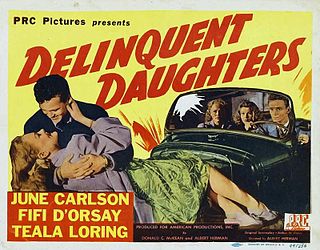
Delinquent Daughters, or Accent on Crime, is a 1944 American drama film directed by Albert Herman and starring June Carlson, Fifi D'Orsay and Margia Dean. An exploitation film, it is about a police investigation into the suicide death of a high school girl and the hard-partying teenagers at a party prior to the incident.
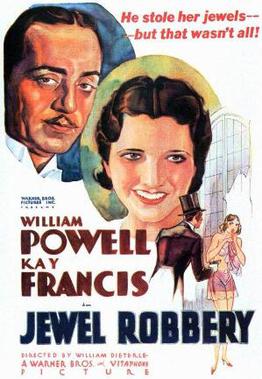
Jewel Robbery is a 1932 American pre-Code romantic comedy heist film, directed by William Dieterle and starring William Powell and Kay Francis. It is based on the 1931 Hungarian play Ékszerrablás a Váci-utcában by Ladislas Fodor and its subsequent English adaptation, Jewel Robbery by Bertram Bloch.
Chris Paciello is an American former Cosa Nostra associate, member of The Untouchables car-theft ring, and government informant who was convicted of racketeering. During the 1990s, and again in 2012, he became a prominent night club owner in the South Beach section of Miami Beach, Florida.
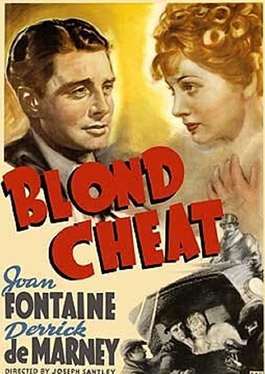
Blond Cheat is a 1938 American romantic comedy film directed by Joseph Santley and starring Joan Fontaine, Derrick De Marney, and Cecil Kellaway. The film was produced by William Sistrom, and originally released by RKO Radio Pictures. The original story is by Aladar Lazlo. The screenplay is by Harry Segall, Charles Kaufman, Paul Yawitz, and Viola Brothers Shore. The tagline for the movie was: "A happy blend of blackmail, robbery, treachery, and love!"

Lady by Choice is a 1934 American romantic drama film released by Columbia Pictures starring Carole Lombard as a fan dancer and May Robson as a homeless drunk asked to pose as the dancer's mother for a publicity stunt, with unexpected consequences. Promoted as a follow-up to Frank Capra's 1933 hit Lady for a Day (1933), it resembles the earlier film only in the casting of Robson.
"The Ivory Tower" is the second episode of the first season of the HBO television series Boardwalk Empire, which originally aired September 26, 2010. The episode was written by series creator and executive producer Terence Winter and directed by executive producer Tim Van Patten.
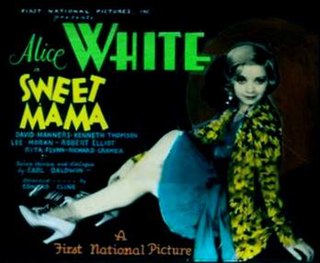
Sweet Mama is a 1930 American pre-Code talkie comedy drama film with songs, which was directed by Edward F. Cline and produced and distributed by First National Pictures. The film stars Alice White, David Manners, Kenneth Thomson and Rita Flynn. Planned as a full-scale musical, and released as such for a short time in the summer of 1930, most of the songs were cut from general release prints by the autumn of 1930 due to the public's aversion for musicals.

The Falcon in San Francisco is a 1945 American crime and mystery film directed by Joseph H. Lewis and stars Tom Conway, Rita Corday and Edward Brophy, who played the recurring role of "Goldie" Locke. The film was the 11th in The Falcon series of detective films, and the eighth featuring Conway as the amateur sleuth. The Falcon in San Francisco was the final film in the series produced by Maurice Geraghty, after which budgets were reduced and location shooting largely abandoned.

Ek Hasina Thi is a 2004 Indian Hindi-language neo-noir action thriller film directed by Sriram Raghavan and produced by Ram Gopal Varma. It stars Urmila Matondkar and Saif Ali Khan, and the screenplay was written by Sriram Raghavan and Pooja Ladha Surti.
Mieczyslaw "Mickey Doyle" Kuzik is a fictional character in the HBO TV series Boardwalk Empire. He is played by Paul Sparks. Mickey Doyle is loosely based on Polish American mobster Mickey Duffy.

Racer and the Jailbird is a 2017 drama film directed by Michaël R. Roskam, starring Matthias Schoenaerts and Adèle Exarchopoulos. A gangster and a racing car driver fall in love, set against the background of a brutal crime gang in Brussels. It was selected to be screened out of competition at the 74th Venice International Film Festival in 2017. It was selected as the Belgian entry for the Best Foreign Language Film at the 90th Academy Awards, but it was not nominated. It received five nominations at the 8th Magritte Awards, including Best Flemish Film.
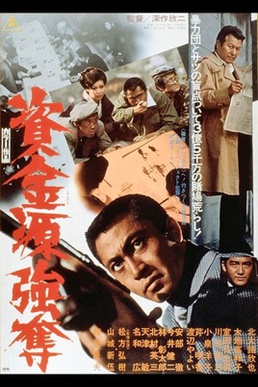
Cross the Rubicon!, also known as Plundering the Source of Capital and Gambling Den Heist, is a 1975 Japanese yakuza film directed by Kinji Fukasaku.














